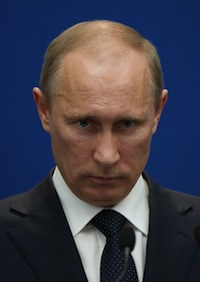Ukraine: Real Danger Right Ahead
Why the next two months are the most dangerous for Ukrainians yet.
March 29, 2014

If you think that Ukrainians faced their maximum point of danger during the bloody days of the Maidan, think again. The period of maximum danger for Ukraine is between now and the May 25 presidential election.
The caretaker government is shaky, especially after the sudden loss of the Crimea peninsula to annexation by Russia.
And if Russia is going to follow up that blitzkrieg operation by invading mainland Ukraine – as President Vladimir Putin claims a right to do to protect “Russian-speakers” there – the attack must begin before mid-May, according to at least one independent Russian military analyst.
The invasion timetable
Politically, the time before the May 25 presidential election would be the best time to mount any attack. This would not allow the new leadership in Kiev to consolidate its authority.
For all the helping hand provided by Washington politically, the fledgling government is weak. It was appointed by the Ukrainian parliament in the turmoil as Ukrainian President and Putin-ally Viktor Yanukovych fled to Russia a month ago. It – or its permanent successor – needs the legitimacy that only free and fair elections could confer on it.
Yet, the interim government faces truly Herculean tasks:
■ It must gain control over the old security services that shot and killed more than 70 demonstrators in Kiev last month.
■ It must avert the national bankruptcy that Yanukovych bequeathed Ukraine.
■ It must devise instant training for the military reserves it has just established to supplement the small, ill-equipped and underfunded Ukrainian army.
■ It must improvise defenses against any further Russian military encroachments in eastern Ukraine—without the help of Defense Minister Ihor Tenyukh.
Tenyukh was just forced out because he sanely did not order Ukrainian troops to martyr themselves by fighting the vastly better-armed Russian forces in Crimea.
Mission impossible for one, not the other
The caretaker government must accomplish this mission impossible at a time when Russia is doing its best to destabilize Ukraine by massing troops on Ukraine’s borders.
To make it appear more “appealing” and publicly palatable, the Russian secret services are deploying busloads of “tourist” provocateurs to eastern Ukraine.
Their task is to mix with the local Russian-speaking population, foment brawls and agitate for regional referendums (“as in Crimea”). Their “mission possible” is to create a kind of autonomy that borders on separatism from the Ukrainian state.
Militarily, Putin is keeping up unrelenting pressure on Ukraine without yet revealing his hand. Michael McFaul, who has just finished his tour as U.S. ambassador to Russia, recently said that he thinks Putin will now pause to consolidate his gains rather than trying to seize more Ukrainian territory.
By contrast, Andriy Parubiy, acting chairman of Ukraine’s National Security Council, expressed serious concern about the 100,000 Russian soldiers he said are massed around Ukraine’s borders.
Without endorsing that specific number, an anonymous senior U.S. administration official stated that these troops “could go at a moment’s notice if Putin gave the go ahead.”
One-sided saber-rattling
The United States and its NATO allies have made clear that they will not defend non-NATO member Ukraine militarily. The main deterrent to any further Russian incursion into Ukrainian territory may therefore be uncertainty by Russian generals about how badly their army might get bloodied in real combat, even by a far inferior army and a drawn-out guerrilla war in Ukraine.
Johan Norberg, a senior analyst at the Swedish Defense Research Agency, raises some of the worries that might lead Russia’s top military command to urge caution.
These worries go beyond the simple observation that Russian forces faced no Ukrainian opposition in their Crimea takeover. That operation is therefore no model for line infantry and tank units. They would have to take and hold territory against resistance.
“Pushing into Ukraine may seem doable, achieving a sustainable outcome less so….Russia could easily get bogged down, much like the Soviet Union did in Afghanistan in the 1980s,” he comments in his study for the Carnegie Endowment for International Peace.
How strong is Russia’s military really?
Russian military analyst Aleksandr Golts agrees that any capture of territory on Ukraine proper would be much harder than the unopposed operation in Crimea. In part, this is due to the resistance expected from local populations.
For all this, in Crimea all that Russian troops faced was a walk-through, quite literally. In Eastern Ukraine, even though the general balance of military power certainly favors Russia, there are many who are not prepared to get swallowed up inside Putin’s “tent.”
After the Maidan, they know they have something to fight for. Plus, they may well be prepared to take a stance. Putin, for his part, may dream of another 1956 – when the Soviet Union obliterated any oppostion to Communist rule in Hungary.
But this isn’t the 1950s anymore. If the only “appeal” that Russia has is to rule by (military) force, what then is it? An oil-fueled Sparta?
Putin’s troops may win that battle, but he must be aware of the asymetry that characterizes modern (civil) war fighting. The Soviets have been a sitting duck before – in Afghanistan.
Something worth fighting for
Putin or not Putin, after 23 years of living in independent post-Soviet Ukraine, a new Ukrainian identity has been forged. Large parts of the generation born after the breakup of the Soviet Union now identify themselves as Ukrainians (and as Europeans).
The mere thought of ever conceiving themselves as (perennially younger) East Slav brothers of the Russians revulses them. They see no future in this – and no value to a life under the stupendous Russian (or Soviet) yoke.
In essence, many younger Ukrainians have “de-slavicized” themselves. That is also why the Russians would probably do well not to believe their own propaganda about how loyal the ethnic Russians in Ukraine’s east are to Moscow.
These considerations may not be enough, however, to stanch Putin’s fury at young Ukrainians for spoiling his Eurasian dream by choosing Europe over East Slav fraternity.
By the May 25 Ukrainian election, we should know whether anger or a cost-benefit reckoning will win out in the Russian president’s calculations.
If it is the former, he will put his country into the column of the forces of yesteryear for many years to come – until a true freedom struggle, embracing the rule of law at long last, gains the upper hand in Russia’s population.
Takeaways
The Russian secret services are deploying busloads of "tourist" provocateurs to eastern Ukraine.
Inside Ukraine, Russia could easily get bogged down, much like the Soviet Union did in Afghanistan in the 1980s.
The main deterrent is uncertainty by Russian generals about how badly their army might get bloodied in real combat.
After 23 years of living in independent post-Soviet Ukraine, a new Ukrainian identity has been forged
Many younger Ukrainians, also in the country’s east, have effectively “de-slavicized” themselves.
Russia would do well not to believe its own propaganda about how loyal the ethnic Russians in Ukraine’s east are

